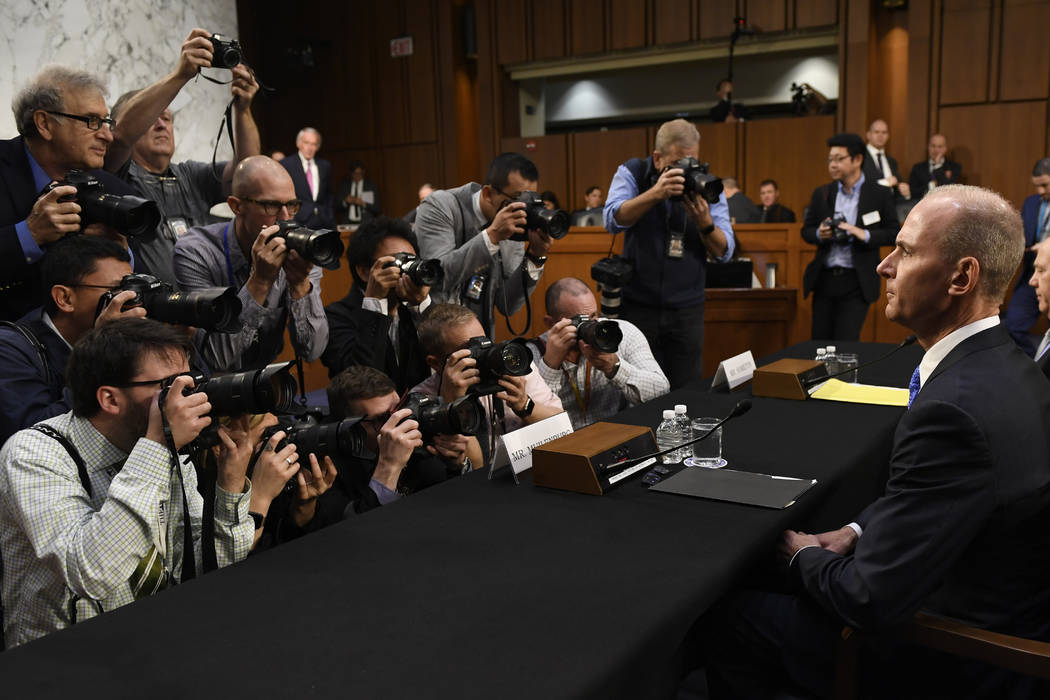Boeing CEO faces second Capitol Hill grilling over 737 Max

WASHINGTON — Lawmakers blasted Boeing and peppered its CEO on Wednesday with questions about the design and marketing of the 737 Max, the plane involved in two crashes that killed 346 people.
House Transportation Committee Chairman Peter DeFazio, D-Ore., said Boeing showed a “lack of candor all through this.” DeFazio and others on the panel highlighted Boeing’s failure to tell pilots about a new flight-control system until after a Max crashed a year ago in Indonesia, and the recent disclosure that a company test pilot raised alarms about the system in 2016.
DeFazio and Rep. Steve Cohen, D-Tenn., also hammered CEO Dennis Muilenburg over his compensation, which rose last year to $23.4 million, including more than $13 million in extra incentive pay, according to a regulatory filing.
‘Made some mistakes’
Muilenburg explained changes Boeing is making in the Max and other steps it is taking to improve safety. He conceded that the company “made some mistakes” in designing the flight system called MCAS, which pushed down the nose of the planes before crashes in Indonesia and Ethiopia.
“We are learning, we still have more to learn, we have to work to do to restore the public’s trust,” Muilenburg said.
Some members of the panel defended Boeing and the Federal Aviation Administration, which certified the plane.
The committee’s top Republican, Sam Graves of Missouri, said he wasn’t absolving Boeing of mistakes but suggested that foreign pilots were partly to blame.
Graves noted the safety record of U.S. aviation — no fatal crashes since 2009 — and a preliminary report on the second Max crash, which revealed that the Ethiopian Airlines pilots were flying so fast it might have hindered their ability to overcome an MCAS malfunction.
“I guess we’re going to have to start building airplanes to the lowest common denominator … if we’re going to export” planes, Graves said.
Months of investigation … 500K pages
The Transportation Committee has been investigating Boeing and the FAA for months, securing about 500,000 pages of documents, some of which they displayed at the hearing.
The committee learned of a manager who said assembly-line workers were being pushed too hard to churn out 52 of the 737s a month in 2018, and he urged that production be stopped. He said he was hesitant to put his own family on a Boeing plane.
Muilenburg said the manager, who has since retired, “raised some good concerns” that the company has addressed. However, Boeing didn’t reduce the production rate until this April, when the grounding of the Max halted deliveries of new Max jets.
Muilenburg’s appearance before the House panel came a day after he testified to a Senate committee. He was criticized by senators over several issues, including failing to tell Congress and regulators about a senior test pilot’s messages that seemed to raise alarms the new flight-control system.
Boeing has been spending months revising MCAS, tying it to an additional sensor at all times and making it less powerful. The company hopes to win approval before year-end from the FAA to get the Max back in the air. Regulators in other parts of the world have indicated they may take longer to review Boeing’s changes to the plane.
After the hearings, Congress is likely to consider changes in how the FAA certifies new planes.